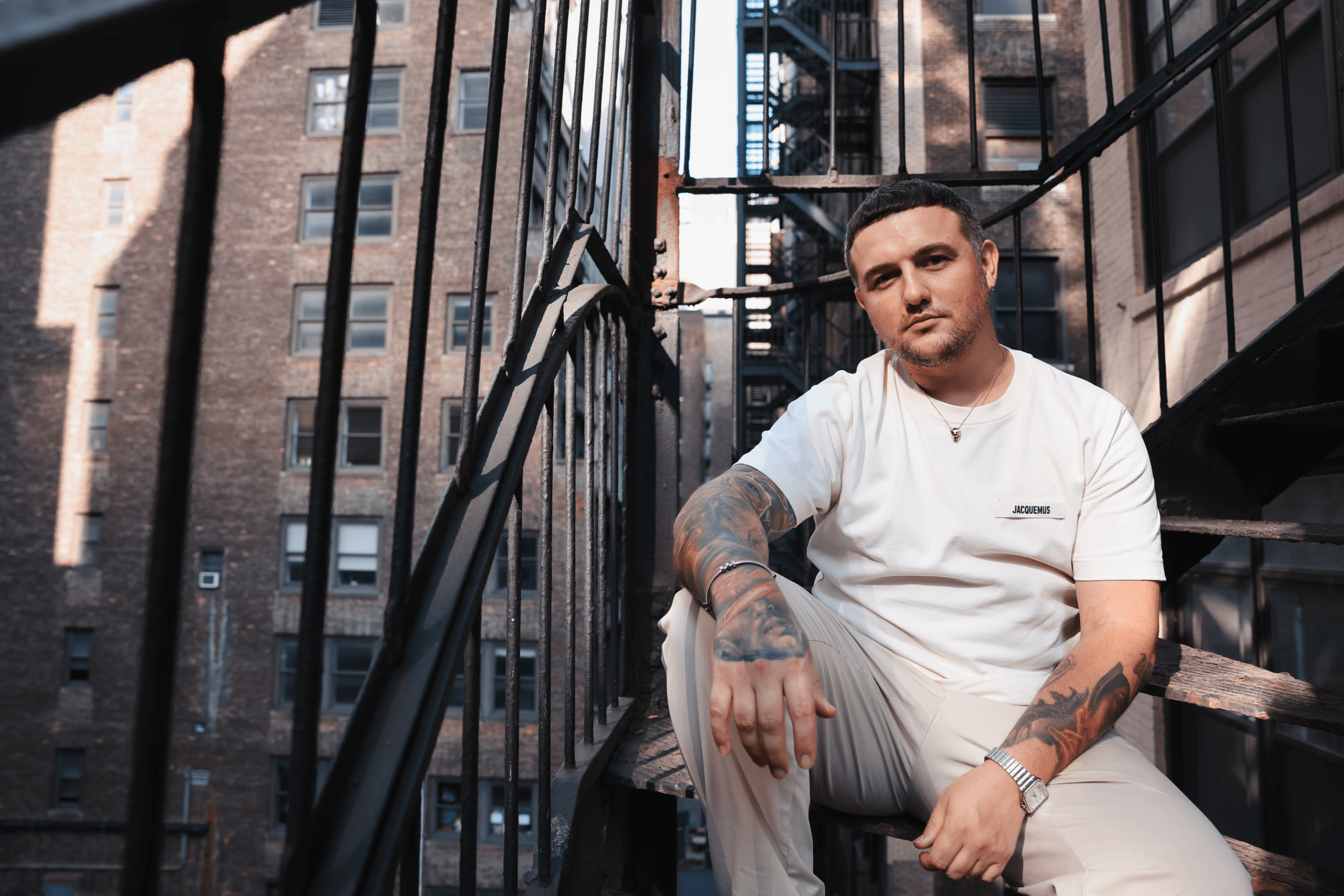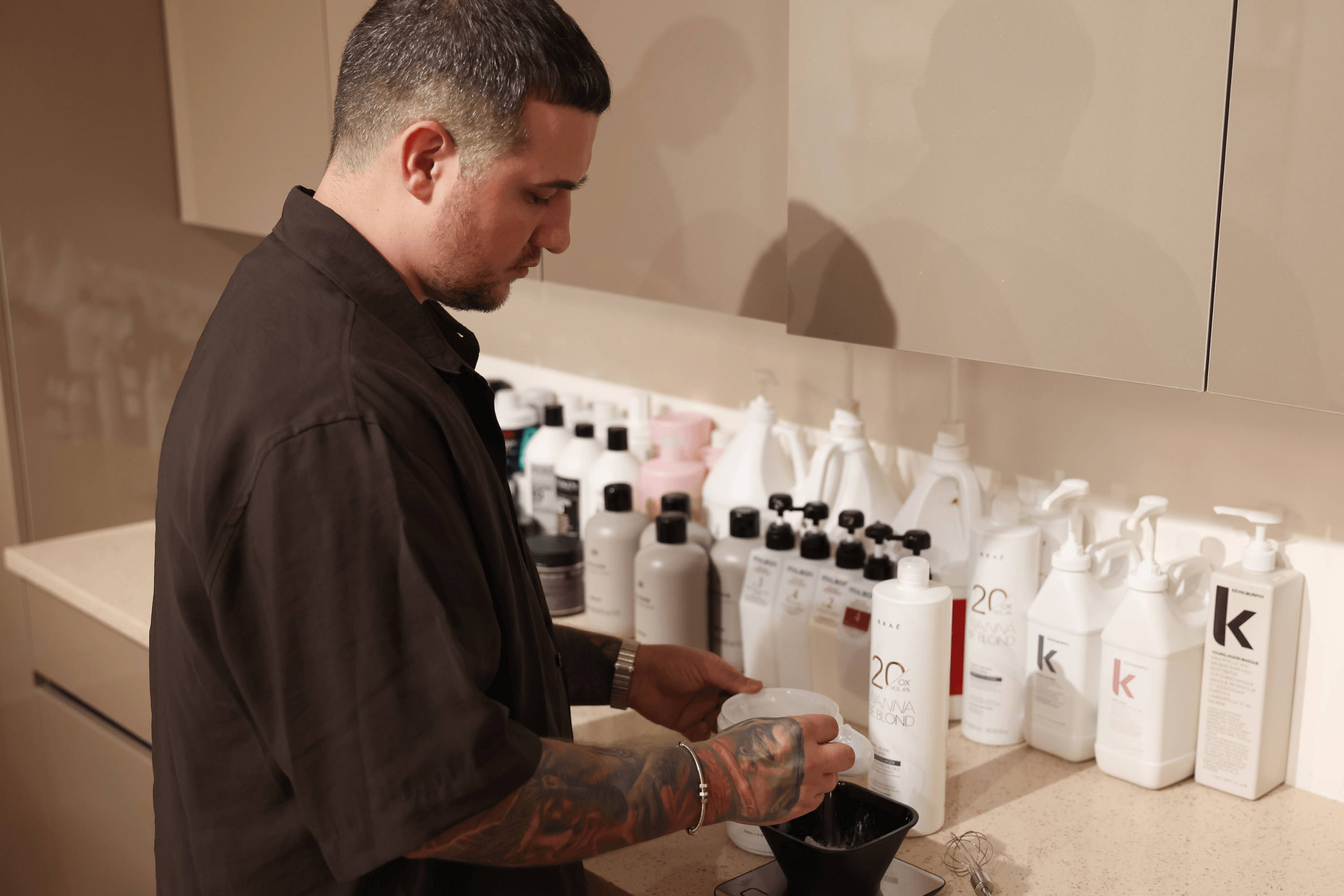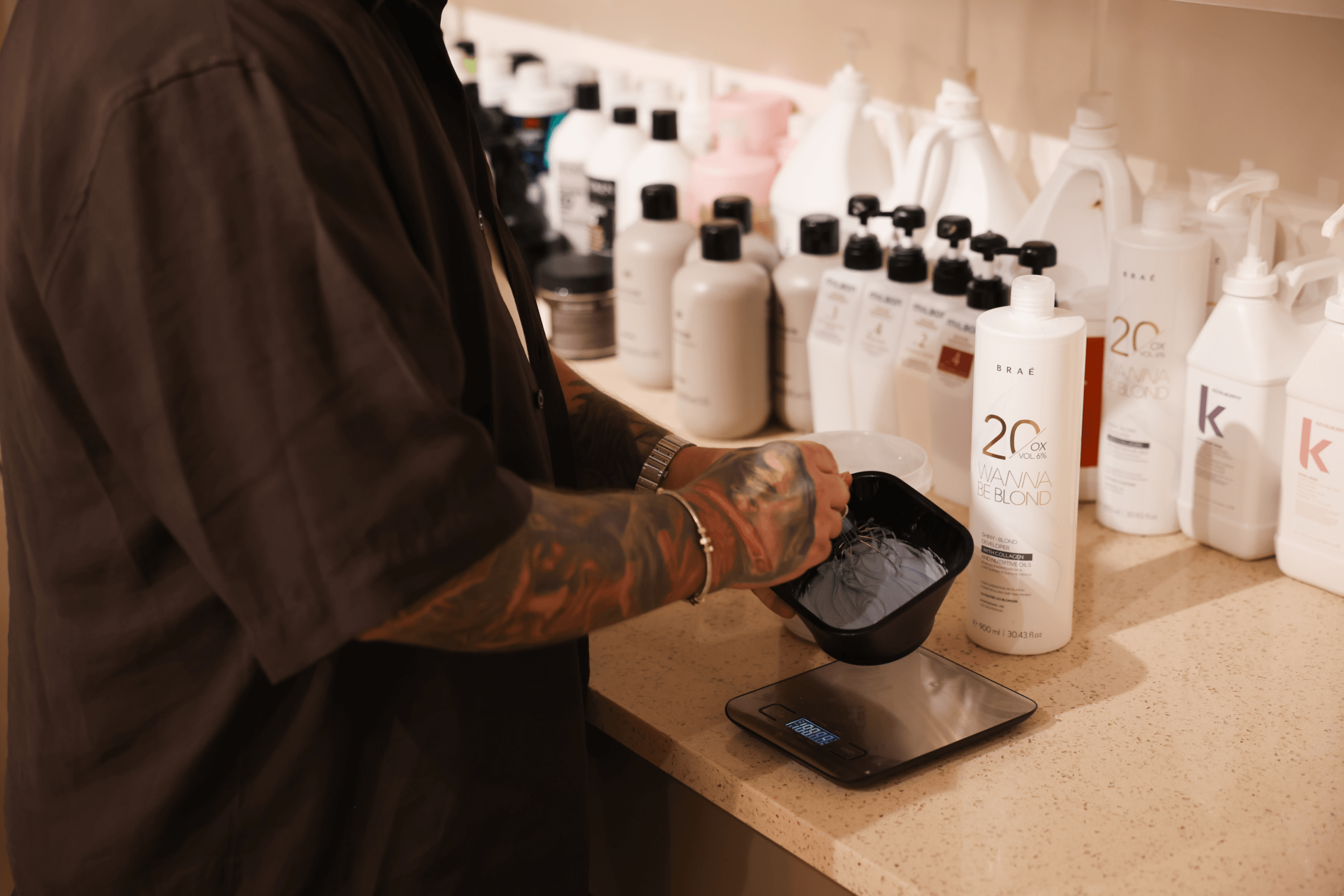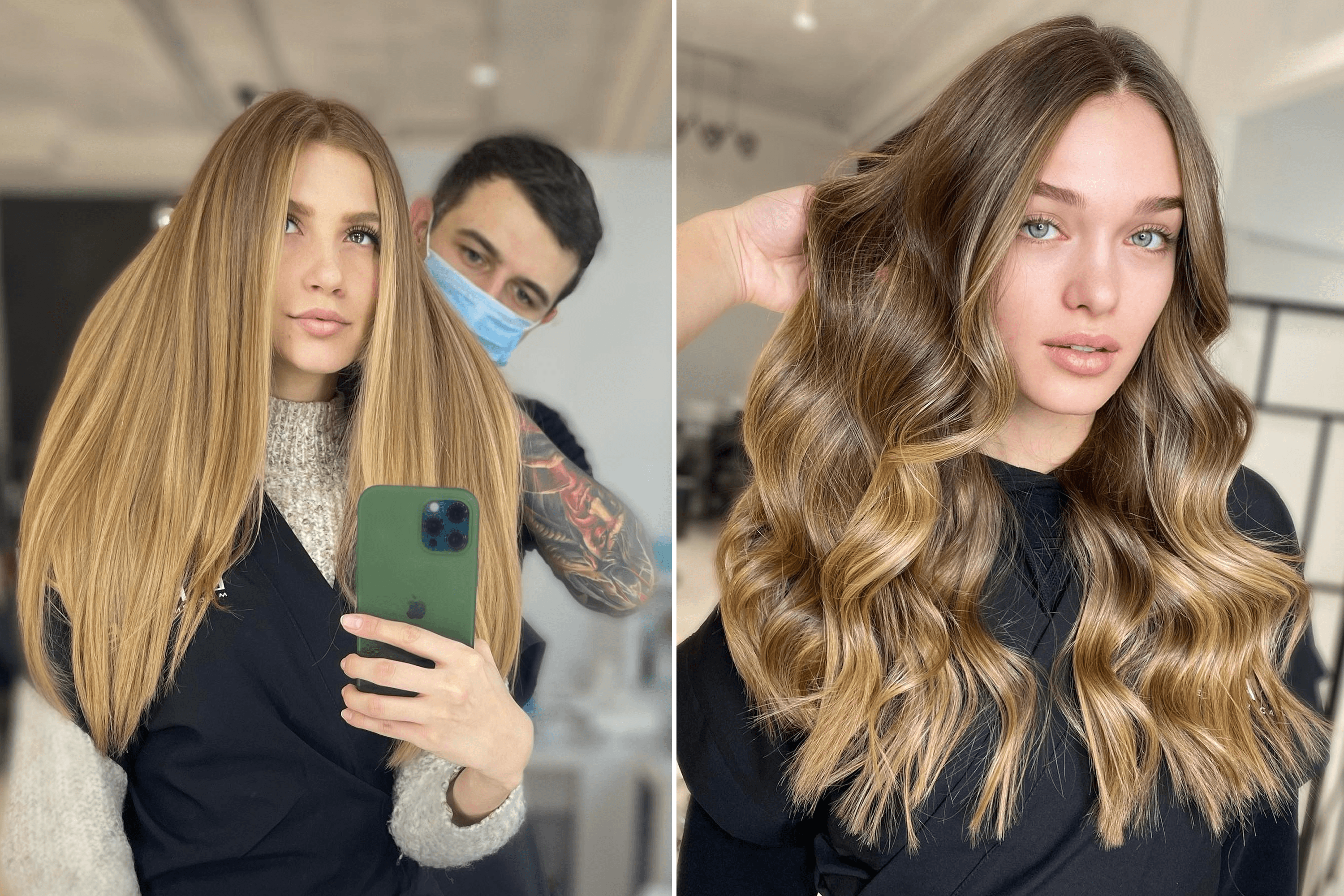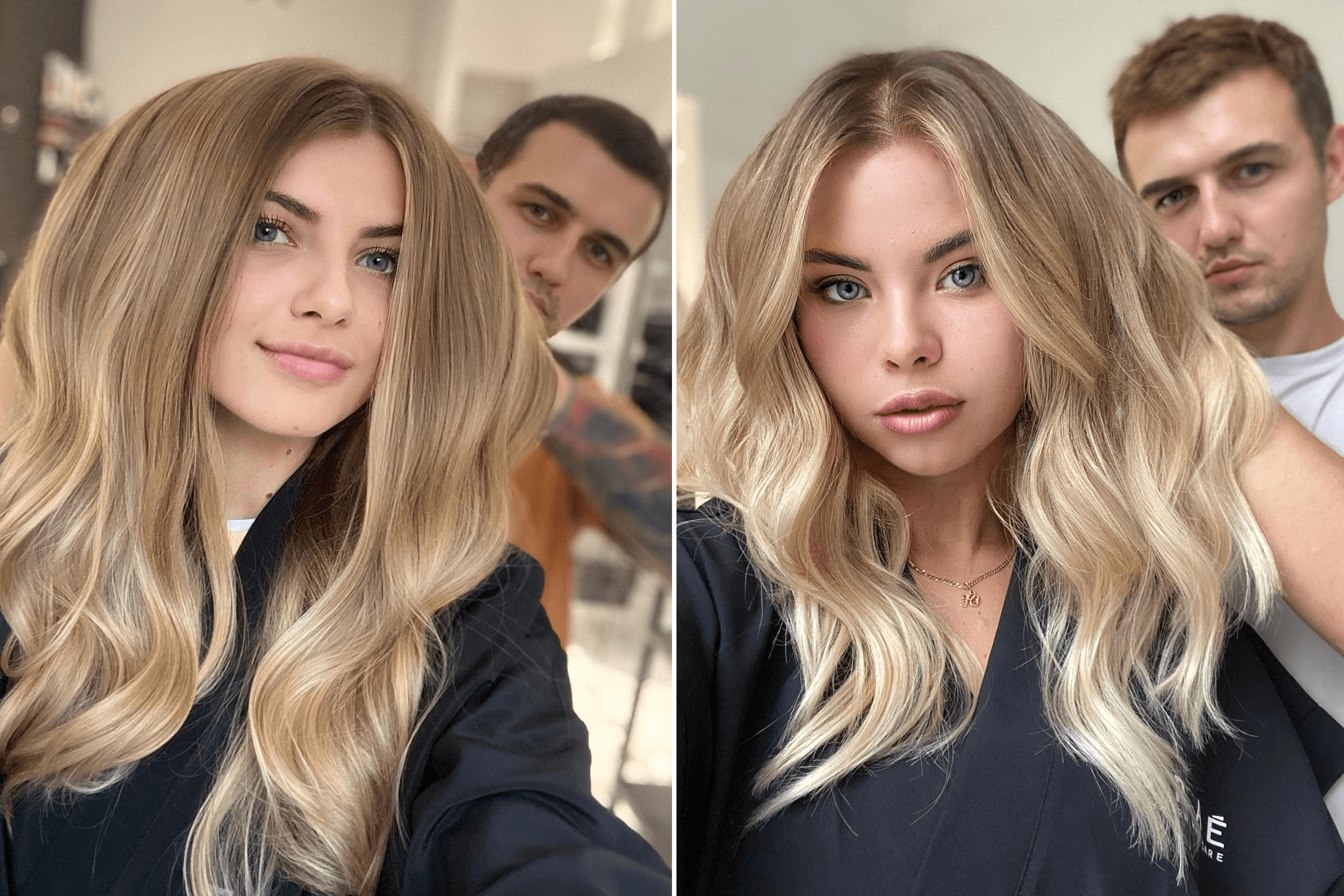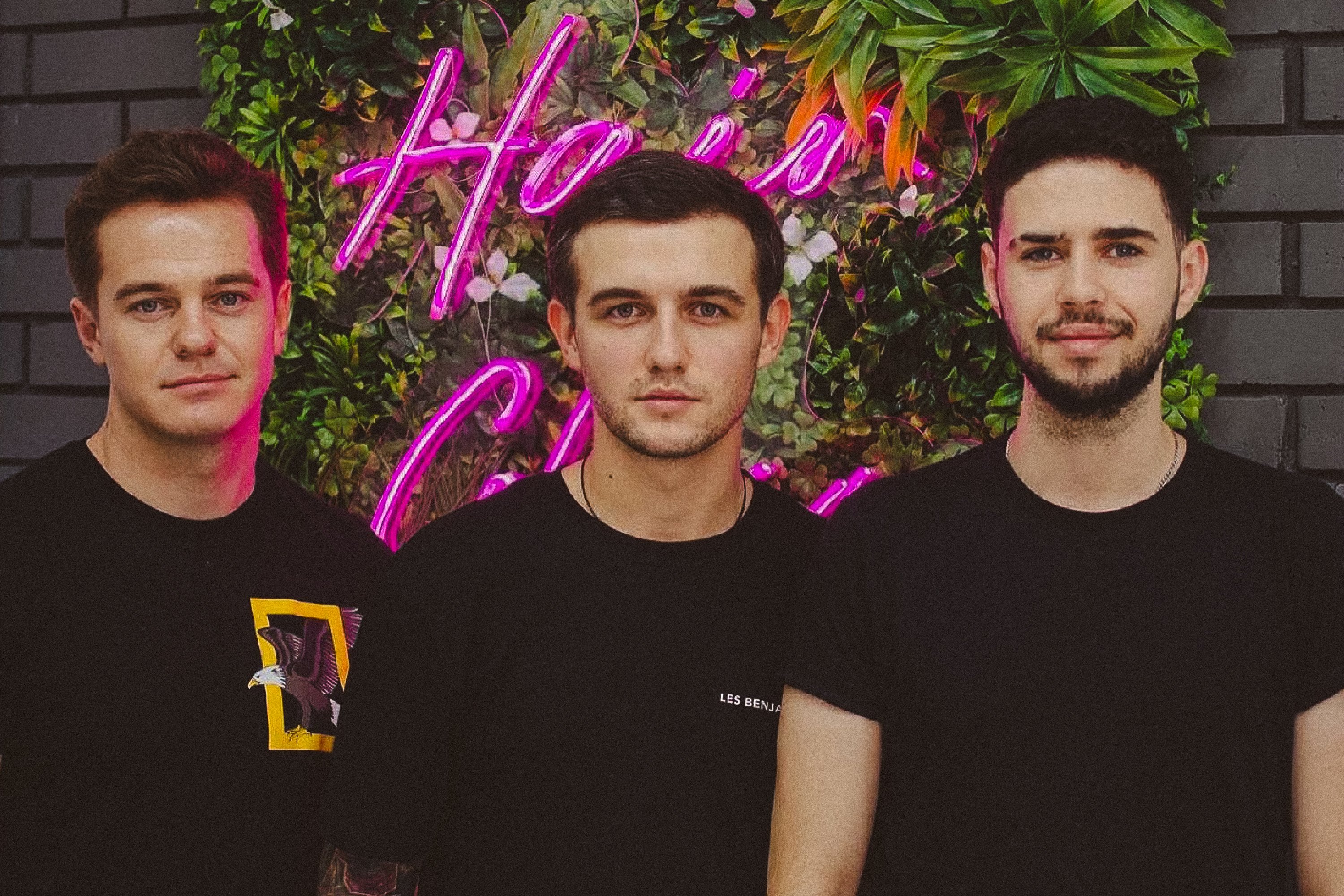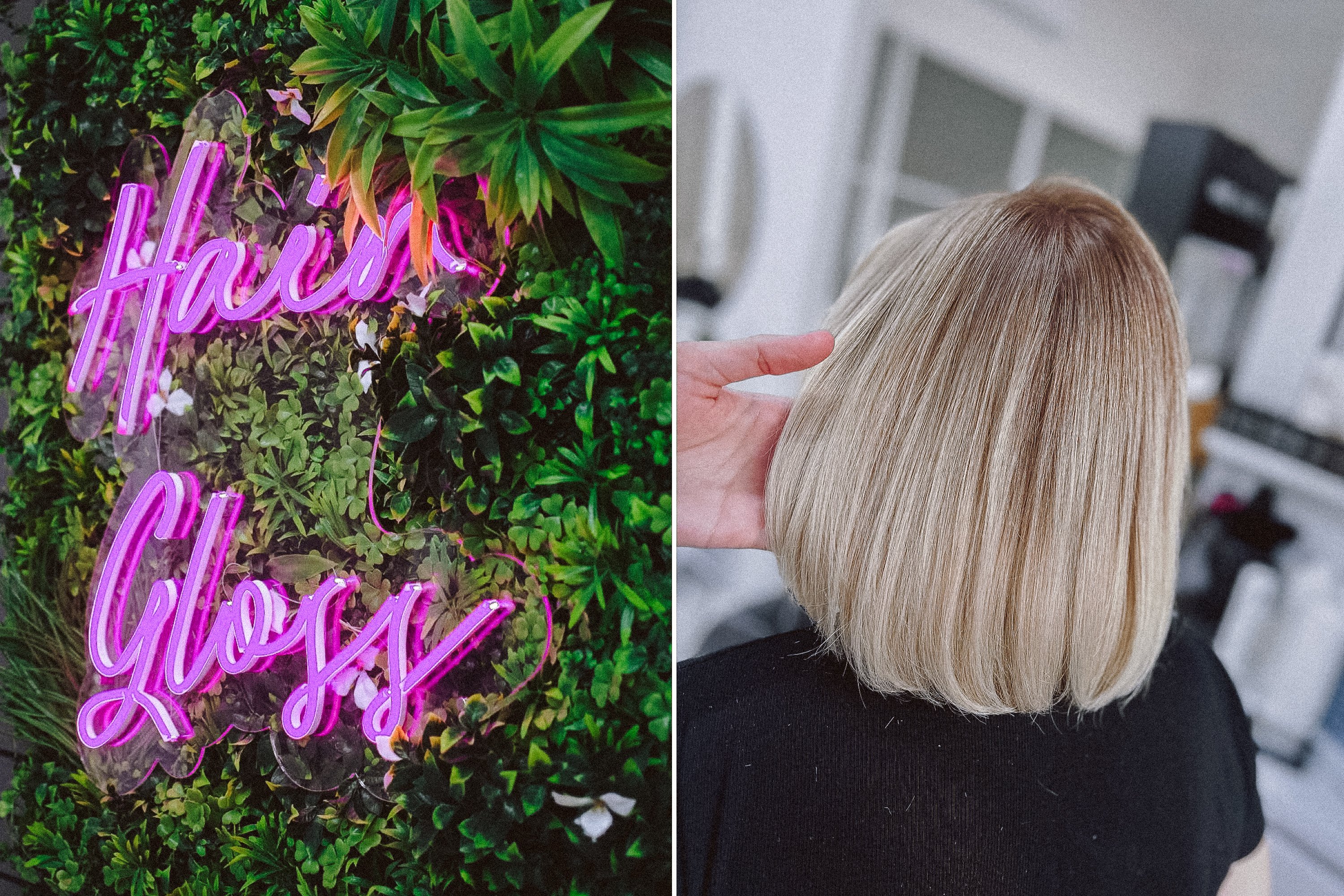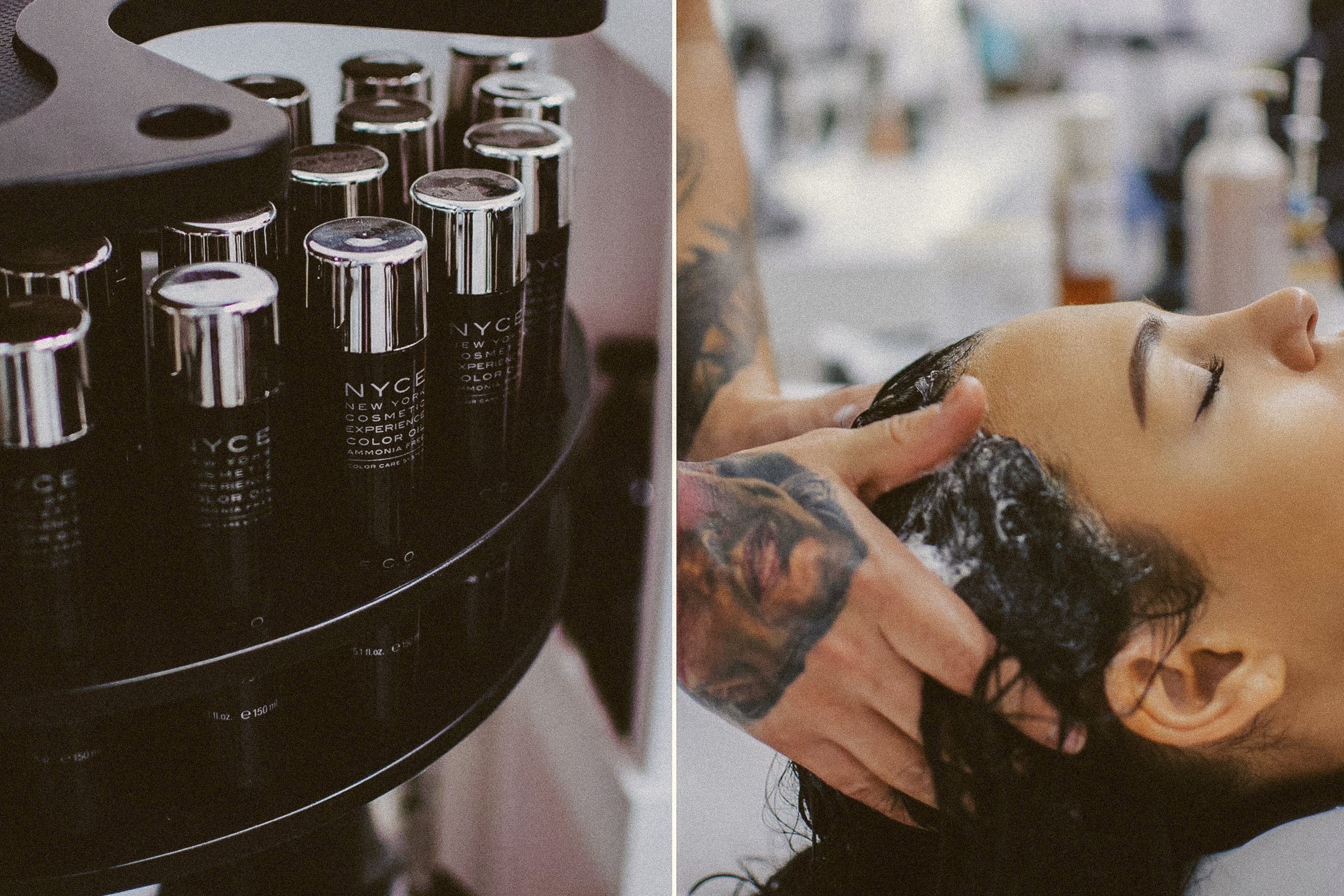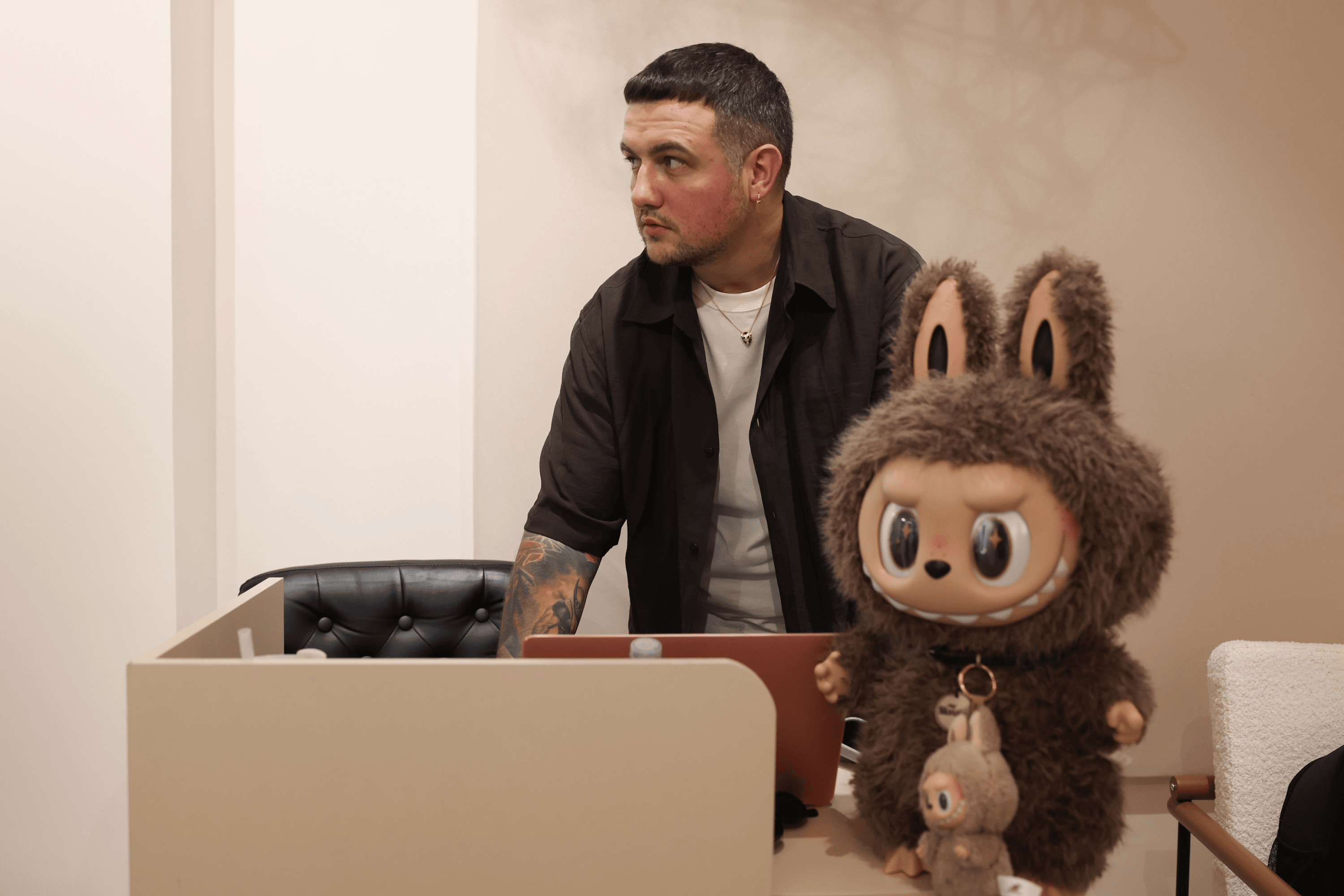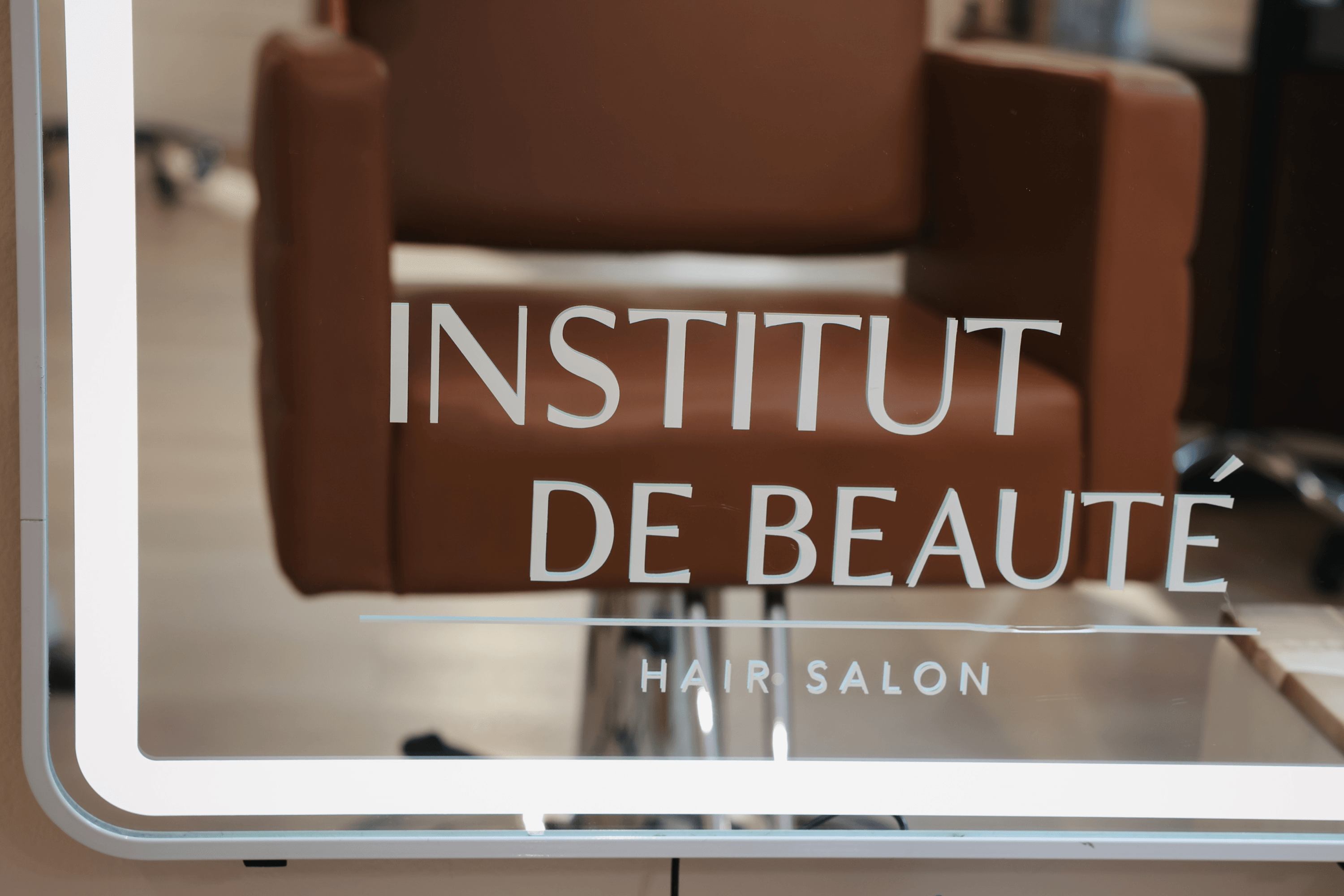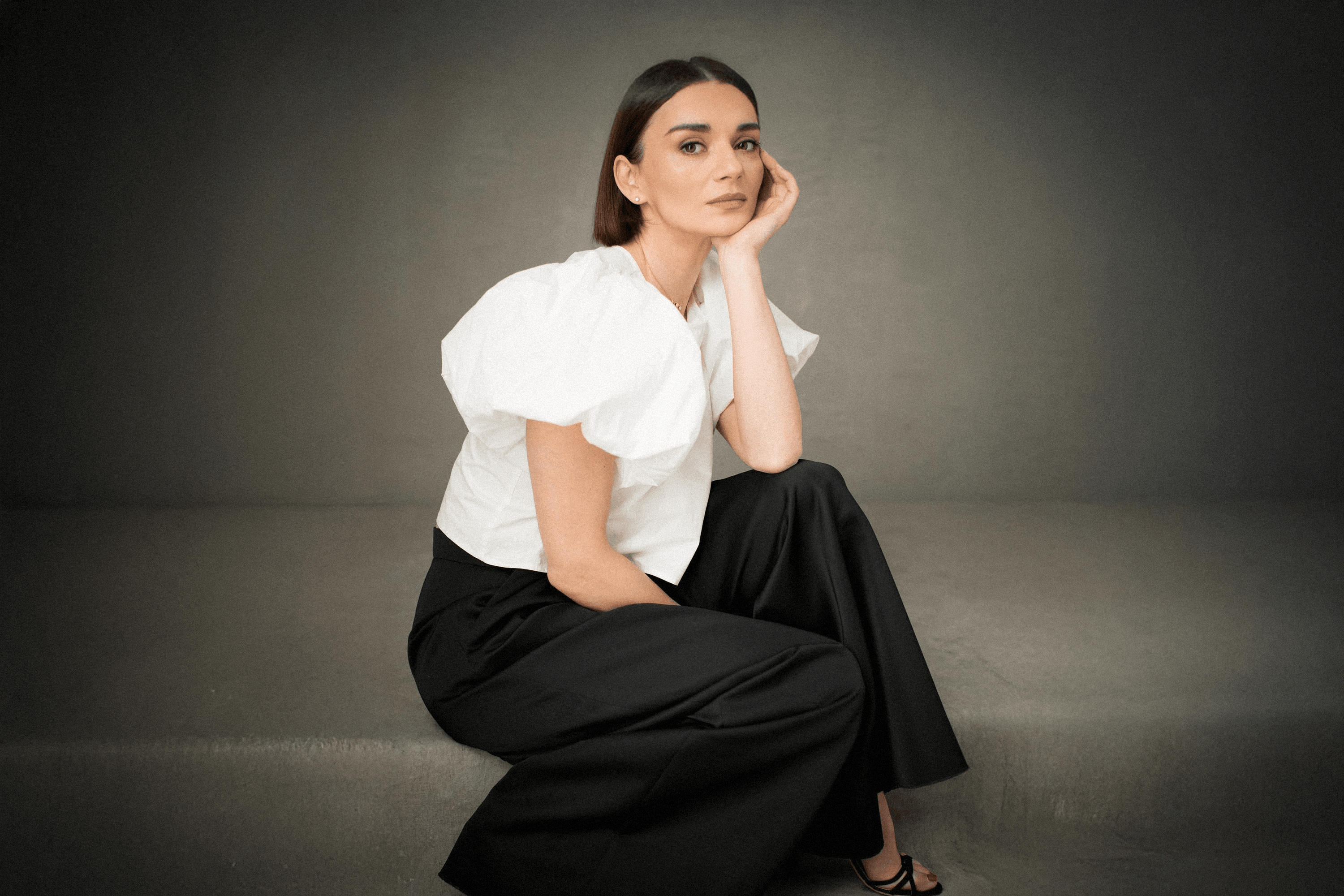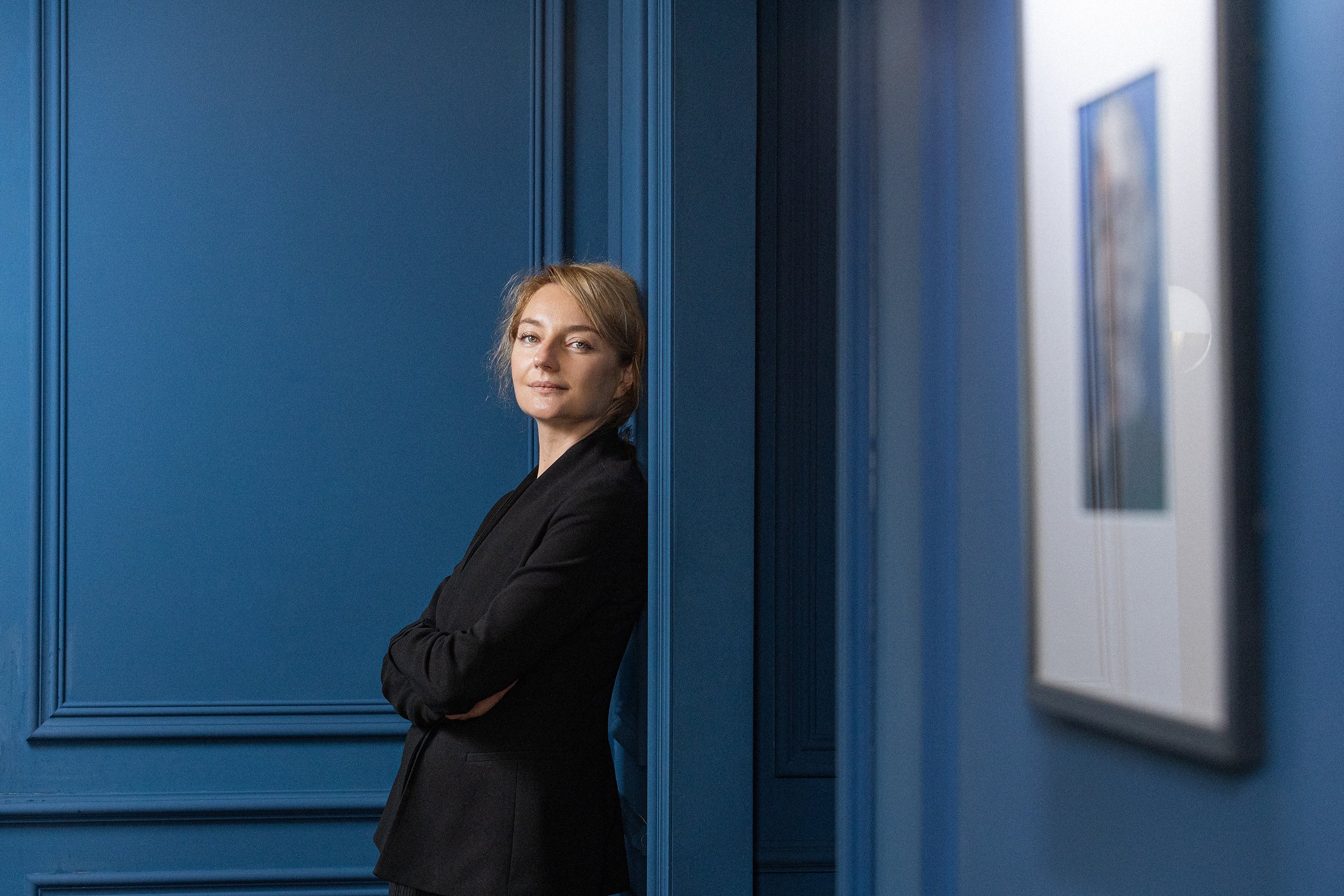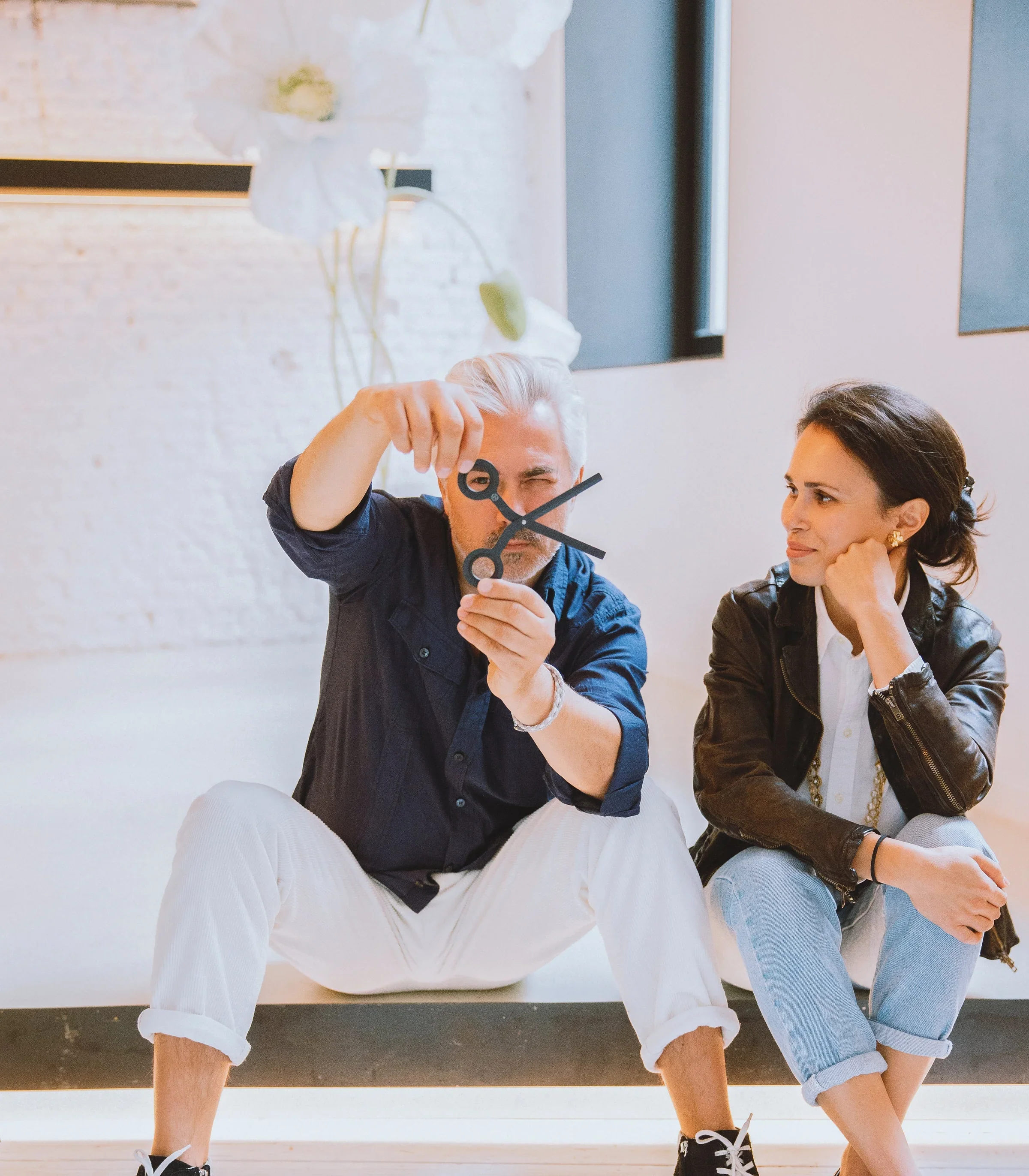Today, Leo Hrabko is a trendy hairdresser in Manhattan. But the road to success was anything but easy. Born in Kherson, a small city in southern Ukraine, Leo grew up knowing that being different could be dangerous. And he stood out in many ways. His parents saw hairdressing as a disgraceful career for a man. People around him rejected his long hair and bold fashion choices. And when Leo came to terms with being gay at 20, he was too afraid to pursue love. But that’s all behind him now.
His parents have come around and are proud of who he’s become. He’s found a loving partner and, in New York, he’s free to be himself in both style and spirit. YBBP journalist Roksana Rublevska sat down with Leo to hear about his remarkable path from a Kherson barbershop to his very own salon in the heart of New York City. It is a tough but inspiring story.
1
On July 16, 2025, in the heart of Manhattan, the newly renovated INSTITUT DE BEAUTÉ beauty salon opened its doors — a proudly Ukrainian salon that, in just two years, grew from a small beauty corner into a 300-square-metre space. Only three years earlier, its founder, 32-year-old Leo Hrabko from Kherson, had nothing in the United States but a couple of suitcases, a head full of ambition, and one audacious dream: to launch a hairstyling career from scratch in the toughest city on Earth. When Leo and his partner, Mykola, landed in New York, they had $23,000 between them. This money became their starting capital for a new life under the United for Ukraine (U4U) program.
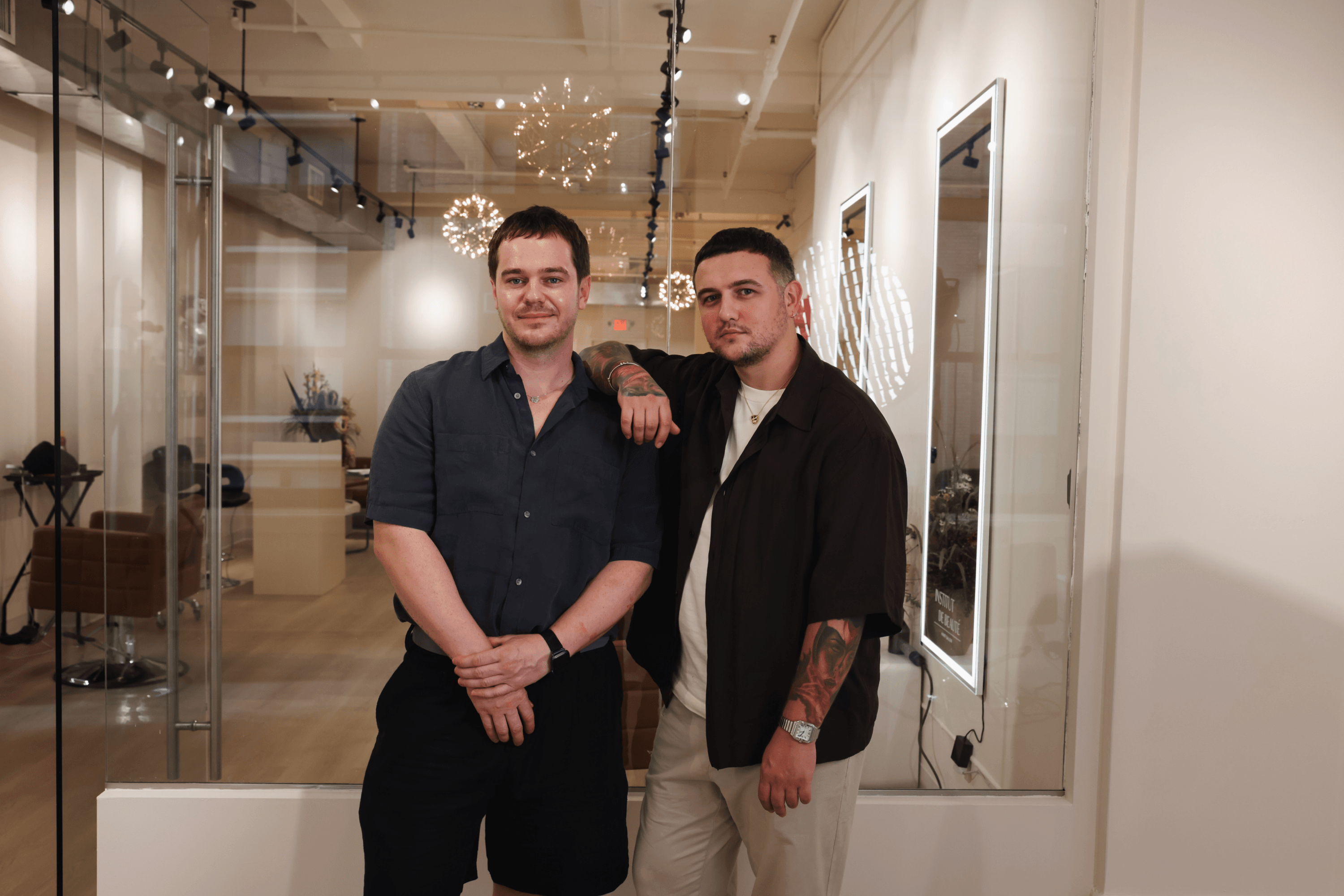
America didn’t exactly give them a warm welcome: they didn’t know a single person in New York, were exhausted and red-eyed from the flight from Portland, and hadn’t slept in over 24 hours. Hotel rooms were going for $500 a night. So they spent their first three days in Brighton Beach — in a cramped room with a three-quarter bed with a cockroach-ridden foam pad for a mattress. Leo remembered an episode of the travel show Heads and Tails, where the hosts found accommodation through Couchsurfing. In desperation, he started messaging people blindly. Just one person replied — an American living in a luxury high-rise just steps from Times Square.
“When we finally called an Uber to head to our host’s place, we got sent a black Cadillac with a panoramic roof by accident — the kind Kim Kardashian would ride in,” Leo laughs. “We were cruising like stars, and I just thought, ‘Yep, we’re gonna make it.’” Turns out, he was right.
Today, almost three years later, Leo and Nick walk into their salon on 38th Street — right in the heart of Manhattan’s Garment District, the city’s iconic fashion neighbourhood. To the left is Fifth Avenue, with its flagship luxury brand stores and towering skyscrapers. To the right — Times Square, just a few minutes’ walk away. And inside — a space that makes you want to stay a little longer.
“We wanted to build a women-centred community, a community built on trust, beauty, and confidence, where people could find friends and partners,” Leo shares. “We’re planning to host workshops, charity events, and cozy little parties right here.”
The salon’s interior is designed in warm beige and brown tones, making the place feel like home. Soft natural light and high ceilings give the space an airy feel — clients often say, “It feels easier to breathe here.” The design ideas came from Leo’s friends: Yana, the salon’s creative SMM manager, and Ruslan Chygryn, the owner of Buzok Flowers.
The salon welcomes not only Ukrainian women, but American clients from the neighbourhood too, drawn in by the promise of “Paris-style” service and the outstanding Ukrainian quality that’s been turning heads across New York in recent years. Since 2022, alongside a wave of immigration, hundreds of Ukrainian beauty professionals have arrived in the U.S., and their approach has reset expectations: fast yet meticulous, always stylish, impeccable hygiene, and attention to detail — all of this has suddenly become the new standard.
“Ukrainian stylists can give you a perfect haircut or manicure, but they’ll also remember your child’s name, your favourite polish colour, and whether you take your coffee black or with oat milk. That’s what brings people back.”
2
Leo (Leontii) Hrabko was born in 1993 in the southern Ukrainian city of Kherson. From a young age, he was drawn to the world of beauty. At 15, he was glued to American makeover shows like Shear Genius, Face Off, and America’s Next Top Model. “I was fascinated by how these artists could completely transform someone and give them confidence,” he says. “It was more than just a pretty picture. That’s when I first felt the power of this profession.”
Back in 2008, Kherson wasn’t a welcoming place for a teenage boy interested in beauty. With his long hair and skinny jeans, Leo was too extravagant in a conservative small city. His parents constantly warned him not to stand out and blend in, warning that it wasn’t safe to be different. But Leo wanted to do the opposite. He wanted to build confidence, not just for himself, but for others too. Even back then, he was cutting his friends’ hair in the kitchen with regular scissors.
But despite Leo’s clear passion for the beauty industry, his parents had different plans for his future. After he finished high school, they enrolled him at the Kherson Institute of Economics and Law, hoping a career in law would give him a stable, respectable future. Leo studied there for a year, but after a summer internship at a law firm, he realized it wasn’t the right path for him.

One evening, while walking through town, Leo spotted a banner announcing the opening of the first hairdressing school in Kherson, supported by the Paul Mitchell brand. The next day, he skipped his university classes to check it out during their open house. The school became his doorway into the professional beauty world. Leo spent a year there and credits much of his foundation to his mentor, the school’s founder, Ella Alyamova. Ella travelled regularly to Kyiv and abroad for advanced training, returning with fresh techniques that she poured into her students. Thanks to her mentorship, Leo gained a solid foundation of skills and confidence.
Leo’s path to becoming a hairstylist wasn’t smooth. When his parents found out he wanted to become a hairdresser, they didn’t support him. In his family, this profession was seen as shameful and unsuitable for a man.
Coming to terms with his identity was equally challenging. Until he was 18, Leo dated girls, but admits he was driven more by social pressure and to meet his father’s expectations. At the same time, he felt he was going against his true self. By 20, Leo came to fully realize that he was gay. But starting a relationship still felt out of reach, the world around him was too homophobic.
At the end of 2014, 21-year-old Leo realised he’d hit a wall in Kherson and moved to Odessa with a friend. However, he didn’t stay there too long. With hardly any hands-on salon experience and a baby face that made him look years younger, Leo struggled to be taken seriously by potential employers. After several unsuccessful attempts to find stable work, Leo returned to Kherson and took a job with his former mentor, Ella. His monthly pay was $150.
3
Since childhood, Leo believed he was destined for something big. Growing up on American makeover shows where ordinary girls became winners, he understood one thing: everyone has a chance.
And when people told him that only a handful of hairdressers ever become famous, he would reply, “Why shouldn’t I be the exception?”
Leo was convinced — if you work hard and put yourself out there, success will come.
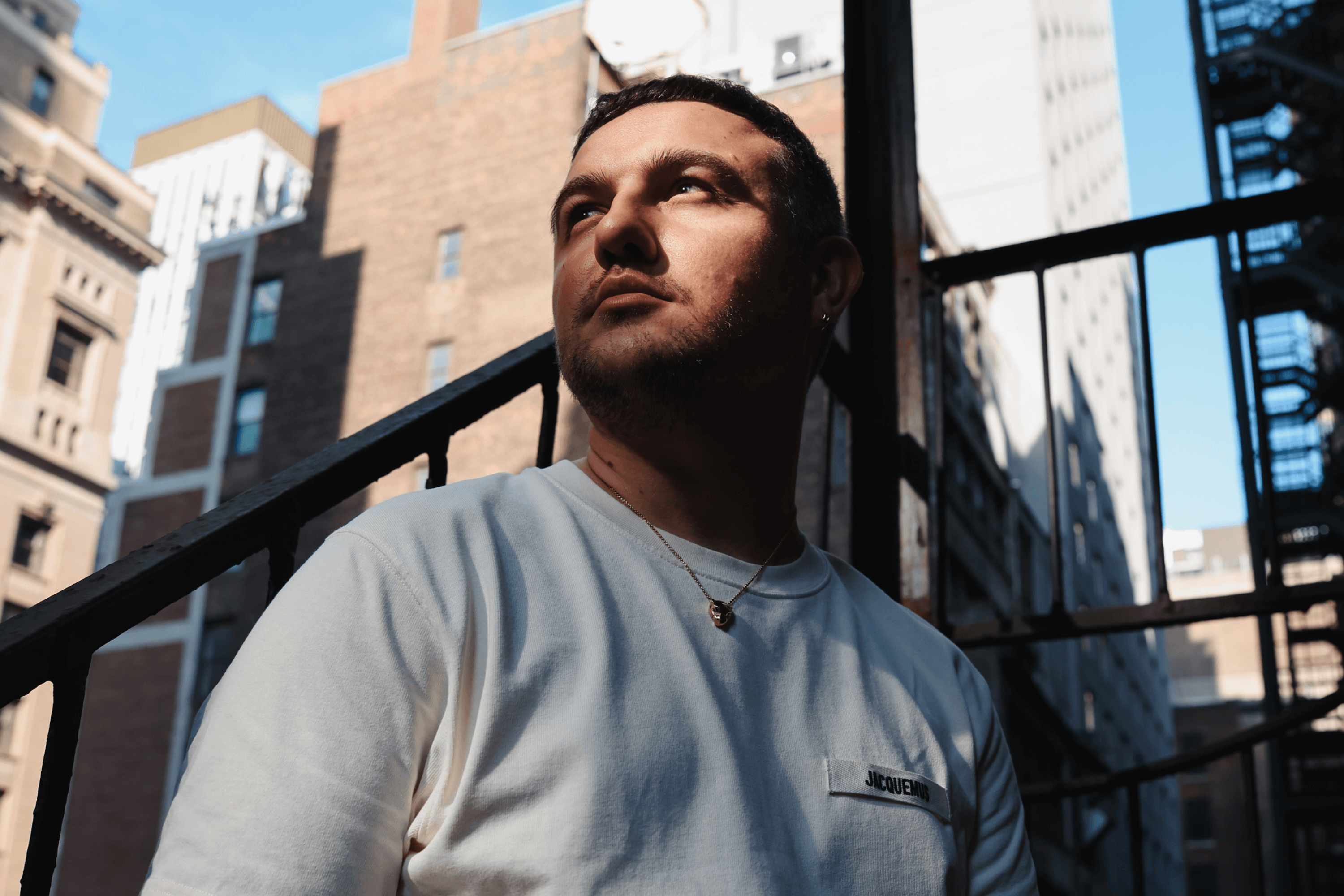
Things were going fairly well for Leo. Within a year, he had increased his income to $600. In 2015, he interviewed in Kyiv with Beauty Boutique, the official distributor of Paul Mitchell and Biologique Recherche cosmetics in Ukraine. He remembers showing up with a suitcase and his toolkit in hand. When asked when he could start, he answered without hesitation: “Tomorrow. I’ve already got my stuff.” The employers were impressed by his attitude and hired him on the spot. The company also ran a salon called Beauty Zone, where Leo worked not only as a hairdresser but also as a product technologist. Along with colleagues, he travelled across the country teaching other stylists how to use Paul Mitchell products. His starting salary was $300, but it didn’t take long before he was earning $1,000.
At 24, Leo took a break to study new techniques that were not yet popular in Ukraine, including AirTouch and Shatush. He taught himself through tutorials he found on YouTube and Instagram. In the winter of 2017, Leo decided to rent a workstation, purchase Paul Mitchell products, which he knew inside and out, and began building his name as a personal brand. At the time, Instagram’s targeted ads were pure gold, and the client list began to grow. His focus was young women, influencers, and bloggers, some of whom he invited for barter collaborations. In 2018, Leo met Nick (Mykola), who would become his partner both in life and business. Nick trained as a colourist, and three years later, the two of them — along with two skincare specialists — opened a joint beauty studio called Hair Gloss in Kyiv’s complex Boulevard of Fountains. The business startup cost them $40,000, split between the four partners. By that time, Leo was also working as a brand ambassador for the Italian cosmetic company Urban Tribe and was travelling to Italy for training, so he had the money needed to invest in the salon.
4
When Russia launched its full-scale invasion, Leo and Nick were in Europe. Over the next six months, they moved between Poland, Germany, and Italy, staying with friends. They lived off savings and cut and dyed the hair of friends and friends of friends free of charge — a way to support Ukrainian women through small acts of care.
It was during this time that an old friend of Leo’s, who lived in the U.S., called to tell him about the United for Ukraine (U4U) program. She offered to have her American boyfriend sponsor them. “Until I turned 26, I spent every day dreaming of New York,” Leo admits. But before the full-scale invasion, he had been denied a U.S. tourist visa twice.
At first, the couple stayed in Portland, living with a friend. But by September, they decided to move to New York. Their budget was tight, just $23,000 between them, which was completely spent within the first two months. They searched for accommodation for a long time, bouncing between cramped rentals, sharing tiny rooms, until they finally found a permanent place in Brooklyn, thanks to a realtor — an African American man married to a Ukrainian woman.
In November 2022, Leo and Nick received their work permits and cosmetology licenses, but finding actual work was tough. Leo still had a small income from the salon in Kyiv, now down to one stylist, but it brought in only $500 a month. And even that, he sent home to support his parents, who were still in occupied Kherson. Then Leo remembered one of his Kyiv clients — a woman who used to fly all the way from New York to have her hair coloured by him. He messaged her, and she went to the Brooklyn salon where she was now a client and recommended Leo and Nick personally. The management looked at their Instagram pages and hired them that very same day.
From day one, Leo made it clear: they wouldn’t be taking on Russian clients. The salon respected that choice. In fact, the business actively supported Ukraine, donating all weekend earnings to the Ukrainian army. The first month was financially tough: there were hardly any clients, and together they earned around $1,500. But within three months, things began to pick up thanks to social media and referrals. Each of them was now earning over $3,000 a month.
One Ukrainian client from Odesa started recommending Leo to photographers. His first shoot was with the New York fashion brand Mini Rose, which paid him $800. That opened the door to more opportunities, including New York Fashion Week and collaborations with a label that designs for Lady Gaga, Paris Hilton, and Beyoncé. Though the creative projects weren’t paid, they allowed Leo to build a strong portfolio with high-profile work.
Leo recalls one of the photo shoots he did with a New York photographer. The model was a tall, radiant Black woman from Europe dressed in a glittering gown reminiscent of Naomi Campbell’s style. No one had warned Leo about the specific requirements for working with this hair type. Working with Black hair is a whole different art — it’s dense, curly, and can be difficult to set. Leo had zero experience with that hair texture, but did it like a pro, calm and confident, as if he’d done it many times before. That shoot marked a turning point. Soon after, commercial offers started rolling in. In just three years, Leo’s work had appeared in L’Officiel, ELLE, Numéro, and Harper’s Bazaar.
In 2023, Leo and Nick decided to sell their share in the Kyiv salon. That same year, his parents finally accepted his career and started to feel proud of him. And in New York, Leo recalls, he experienced the freedom to show love without fear. “Here, you can take your partner by their hand, kiss or hug them, and not worry that someone will hit you or yell something in the street. That’s what safety means. And everyone deserves it.”
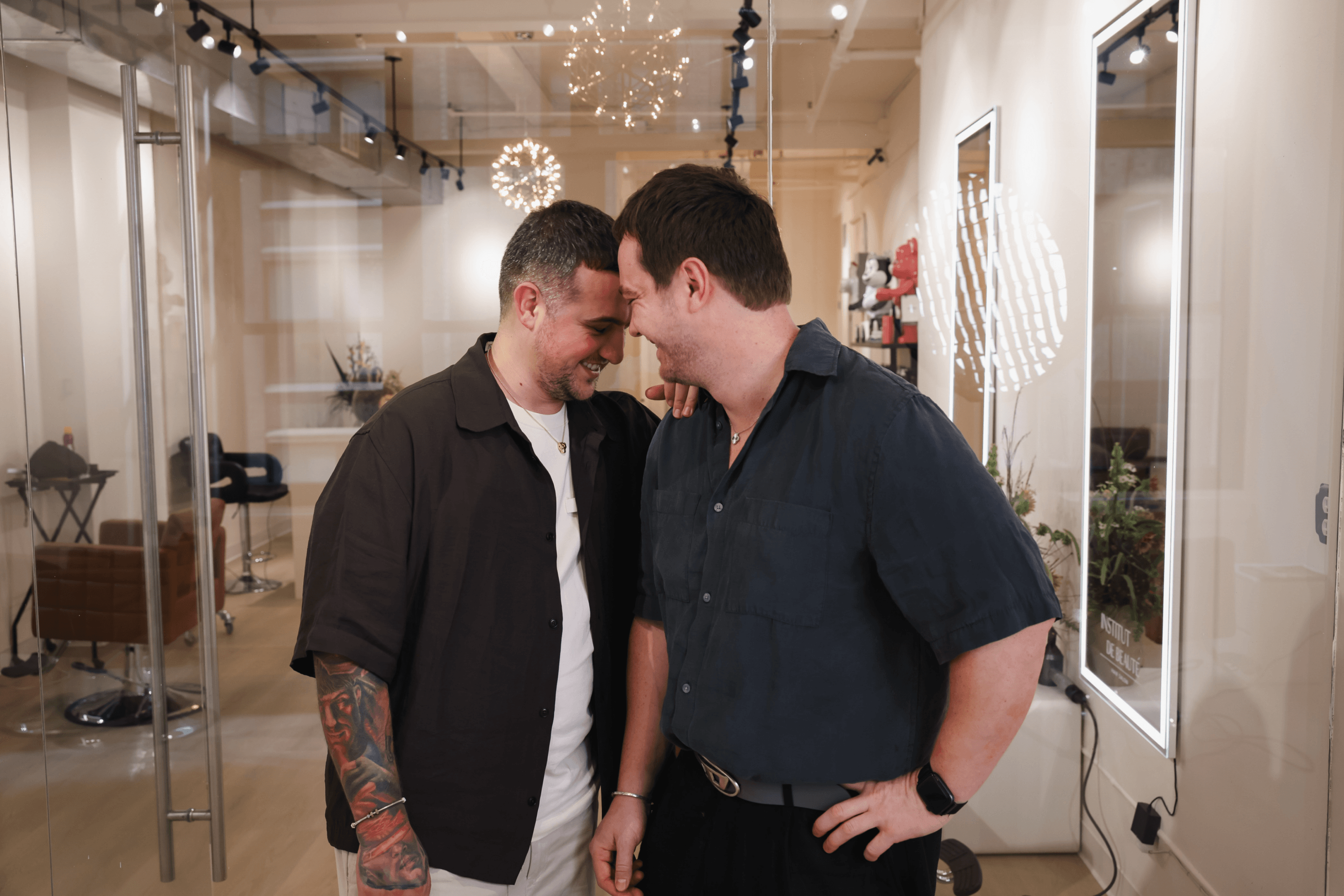
5
In June 2023, Leo left the Brooklyn salon and went independent. By then, most of his clients were already booking with him directly, coming through social media and word of mouth.
“When I realized it was time for us to grow, I understood: we needed to create our own space,” he says. “A space where we could offer top-tier service without the pressure or the rush. No client assembly line. No bending to someone else’s rules or schedule.”
Leo eventually found a spot to rent in a salon in SoHo, having received many rejections due to bias against Eastern European migrants before that. In SoHo, he rented a chair for $180 a day and set to work building his own business. Word of mouth worked best — his Manhattan client base turned out to be even larger than in Brooklyn, and his rates began to rise with demand.
Setting up his business legally in the U.S. turned out to be very straightforward. Leo registered an LLC, which handled all incoming payments. “In the U.S., taxes aren’t paid monthly but are calculated annually, so you only see the full picture at the end of the year. That was a new experience for me,” Leo says.
The first four months, Leo worked from a rented chair in a Manhattan salon. Later, Nick also left the Brooklyn salon and decided to join him. The two began looking for a space they could rent together. That’s when they came across the suite model — a co-working concept popular in the U.S. beauty industry: a large commercial space divided into private rooms, each rented by independent stylists and specialists. They managed to find a compact two-person suite — about 160 square feet — with shared access to a kitchen, laundry area, and bathroom on the floor. Rent was $2,800 per month. They decorated it themselves, giving the space a clean, minimalist look with mirrors and a warm, welcoming vibe. Their total investment was around $10,000, money they’d saved from previous work.
In October 2023, they officially named their business Institut de Beauté. In French, it means “Institute of Beauty” or “Beauty Centre. The name was no accident. They liked that it would be easily understood by clients of any background. Still, around 70% of their clientele are Ukrainian women. Another 20% are international expats, and about 10% are Americans. Leo and Nick have always positioned themselves as Ukrainian stylists, and they continue to work by the high standards that Ukrainian beauty pros are known for.
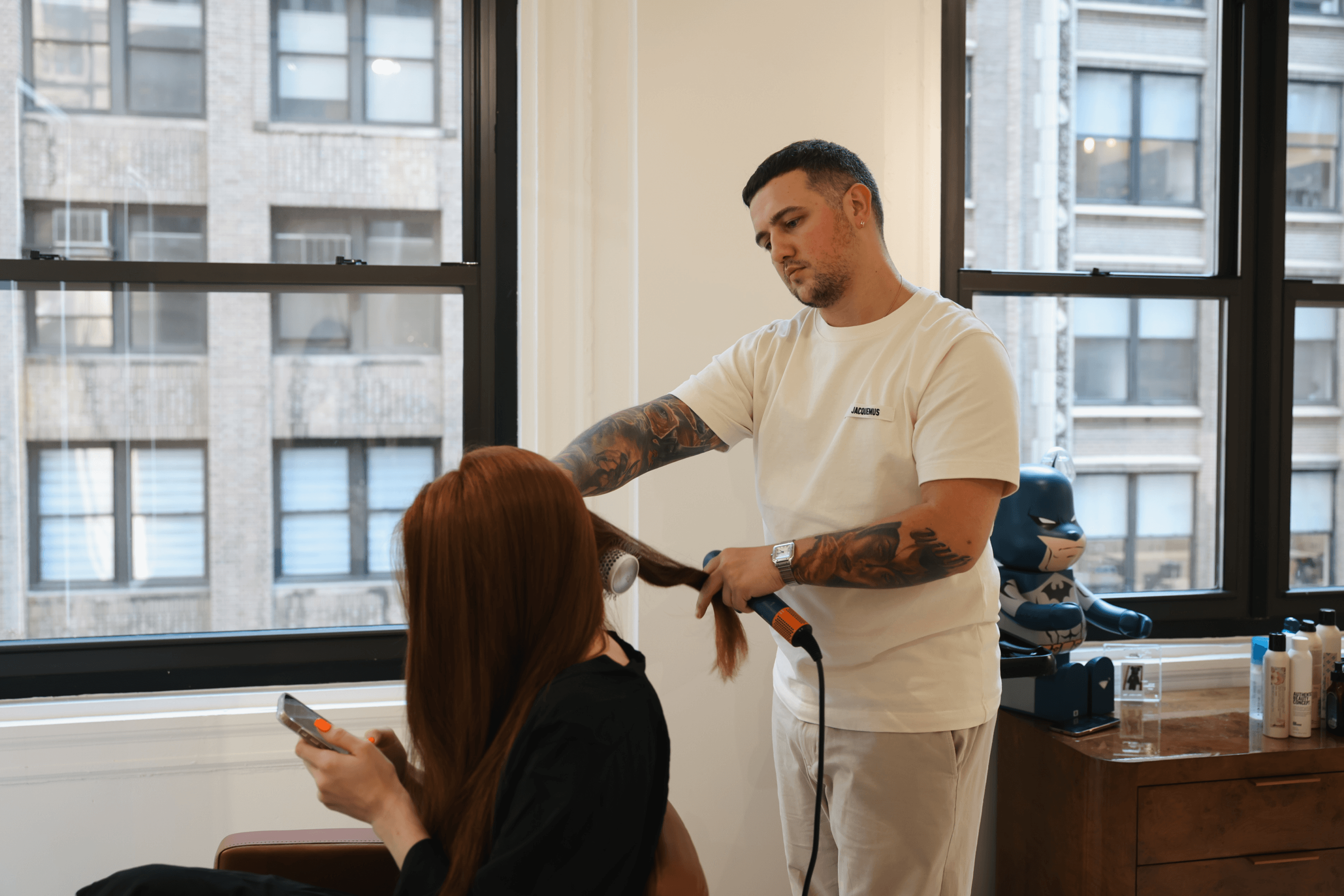
As the number of clients continued to grow, Leo and Nick quickly outgrew their cozy suite. They began looking for a larger space, but finding commercial real estate in New York is complex and expensive. Most landlords ask for first and last month’s rent, plus at least 3 months’ deposit. And on top of that, you’ve got to have flawless paperwork or an investor behind you. They had neither.
So they held on to their little studio for nearly a year — until the summer of 2024, when a bigger unit became available right in their building. It had its private entrance, floor-to-ceiling windows, and room to expand. The rent was $6,000 per month. The new studio featured three workstations and direct access from the street. Leo and Nick focused on offering high-quality services and advanced colouring techniques. On average, they served up to five clients a day, generating around $1,500 daily between the two of them.
Leo admits he’d always dreamed of New York — drawn to its energy, its style, rhythm, aesthetic, and challenges. Mykola, on the other hand, preferred a quieter life. But over time, as the couple settled in, found steady work, and filled their days with comforting routines, the city began to reveal a different side to him, too.
Today, the couple sees the U.S. as their home and plans to stay. Their focus now is on the possibility of legalizing their status through professional achievements, by switching to an O-1 visa (visa for individuals with extraordinary abilities) or applying for a green card based on business ownership.
6
On July 16, 2025, Leo and Nick proudly reopened INSTITUT DE BEAUTÉ — this time, in a brand-new location. They rented a unit in a twelve-storey office building in the heart of Manhattan’s Garment District, just one block away from Bryant Park. The search for the right place didn’t come easy. A friend of one of Leo’s clients, who works at the top-tier real estate firm Ryan Serhant, stepped in to help. After lengthy negotiations, the team secured a five-year lease. The funds came from the couple’s savings — a financial cushion they’d been carefully building. The total cost came to $80,000, with $25,000 of that covered by credit. “New York moves at a crazy pace — something new opens every day, and you simply don’t have time to be afraid,” says Leo.
Leo believes that what sets them apart in the market is a commitment to premium service: thoughtful customer care, in-depth free consultations, a personalized approach, and high-quality products. He says that in the U.S., a lot of salons work fast, skipping toning and aftercare. It’s a client conveyor belt. Leo’s clients seek something different. They’re looking for quality and long-lasting results. It’s a reflection, he believes, of deeper cultural differences in beauty standards and values.
This September, Leo is launching an in-person hairdressing school that will teach cutting and colour techniques. The two-month program will cost $7,900.
The salon team now includes seven Ukrainians — one administrator and six stylists. There’s no base salary for the hairdressers: they earn 50% of each service they perform.
“We really support each other — both in life and in business,” says Leo about his relationship with Mykola. “We divide responsibilities based on what comes more naturally to each of us. Kolya has strong English, so he handles all the communication with contractors. I’m great at researching products, so I manage all the cosmetic and equipment purchases. We’re both far from home, but our partnership gives us emotional strength and stability.”
Today, INSTITUT DE BEAUTÉ brings in roughly $60,000 a month. Over the past two years, the salon’s client profile has evolved as well. These days, their typical clients are stylish, fashion-conscious women, often successful businesswomen. Leo and Nick don’t take male clients themselves, but two stylists on their team specialize in men’s grooming, ensuring that niche is fully covered.
Leo says that INSTITUT DE BEAUTÉ is not just a place where you get a haircut or a colour. His vision was bigger: to build a creative space where fashion, skill, and genuine, empathetic care come together.
“People don’t return just for the hair,” he says. “They come back for how it makes them feel — for the confidence, the emotion. It’s about the feeling that stays with you long after you’ve left the chair.”
